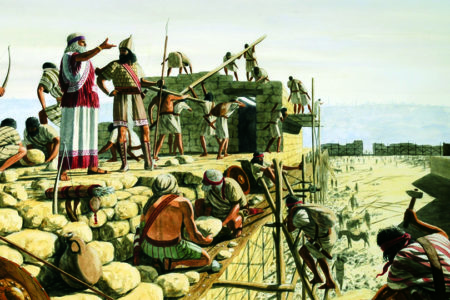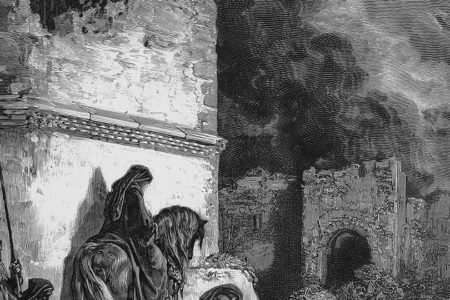The Faithful Remnant
Among the material possessions Maxine and I hold dear is an old oak dining room table. It was the object of a rescue effort launched years ago when we discovered the table, weighed down by multiple layers of paint, stored in the corner of a ramshackle barn in Illinois. The table, long since spruced up by being restored to its original oak finish, now reposes in the corner of our living room. Today its only task is to support a lovely plant and a reproduction of a Tiffany lamp crafted by our son. I can’t tell you what the going price for that time-worn artifact would be today. But we’re not really interested in knowing, for that scarred old table is not for sale at any price—and I suspect you know why. It is a tangible remnant of Maxine’s childhood and a constant reminder of pleasant mornings with boisterous brothers, mountains of steaming pancakes, and the attentive eye of a mom who diligently labored to send them off to school without a hunger pang. The table is, therefore, an invaluable remnant linking the past—with the joy of things remembered—to the future.
Of profoundly more significance are the remnants that are treasured by God. These remnants have been operative across the centuries and millennia and have, in actuality, been the central factor in all of God’s dealings in the midst of frail humanity.
The Remnant Principle
When, in His timing, God began to bring definition to the redemptive program, Abraham was separated from the mainstream of humanity, and a remnant nation—Israel—was formed. From Abraham’s seed another remnant was chosen, as Isaac and his posterity were identified as recipients of the great Abrahamic Covenant promises. From Isaac’s seed through a specific family—Jesse—a God-ordained king—David—was chosen. And, ultimately, from David’s remnant of the nation the Messiah stepped into time. This resulted in the birth of the present remnant, the church, in which elements from among both Jews and Gentiles are being called out as a unique “people for his name” (Acts 15:14). The relevant point is that God has always worked through remnants-those taken from the mainstream to be identified as instruments to accomplish His divine purposes.
Few places in biblical history speak to this fact more eloquently, or profitably, than the remnant discovered in the Book of Nehemiah. Through that remnant’s very existence and manifest determination, against seemingly insurmountable odds, to finish the work He had given them to do, we discover principles for living that can revolutionize our lives.
The Spirit of the Remnant
God’s remnant during the days of Nehemiah developed in three stages. The initial detachment answered the call of Zerubbabel in 538 BC. Over 50 years later, in 457 BC., Ezra led another contingent from exile back to the land. Nehemiah began his famous expedition some 13 years later, in 444 BC.
The numbers of returnees who mounted the way from Babylon to Jerusalem were, humanly speaking, rather insignificant-approximately 50,000. But, as is true in the case of every God-woven remnant in history, minor numbers made a major difference to the future of Israel and, for that matter, life on this planet.
When I say the remnant answered a call, I am not stretching the point. Ezra 1:3 records the words of Cyrus, king of Persia, to the Jewish people in his kingdom: “Who is there among you of all his people? His God be with him, and let him go up to Jerusalem, which is in Judah, and build the house of the Lᴏʀᴅ God of Israel.” Most of the Jewish people who were in the land as a result of the Babylonian captivity were not listening for such a call and, as historical evidence confirms, did not desire to return to the stricken land of their fathers. Many were, in a word, disinterested. Why, indeed, should they leave a place of relative prosperity for the uncertainty and danger awaiting those who dared return to their stricken country? But these people can be compared, I think, to those who responded to the repeated challenge the Lord issued in the early chapters of the Book of the Revelation. His call to churches of the last days—plagued with indifference, heresy, and rampaging apostasy—is straightforward: “He that hath an ear, let him hear” (Rev. 2:7, 11, 17, 29; 3:6, 13, 22). Most could not, as we can attest, care less. But, as in every age, there are those who have an ear to hear.
Beyond this ear-to-hear willingness to return and rebuild Jerusalem’s razed Temple and ruined walls was a unifying commitment. These were people “whose spirit God had raised, to go up to build the house of the Lᴏʀᴅ which is in Jerusalem” (Ezra 1:5). Ezra 7:10 gives the pattern for the faithful few who made up the contingent of Temple and wall builders who labored beside God’s chosen leaders, Ezra and Nehemiah: “For Ezra had prepared his heart to seek the law of the Lᴏʀᴅ, and to do it, and to teach in Israel statutes and ordinances.” Prepared hearts, a will to do, and a passion to communicate the truths of Scripture represent driving forces in every remnant truly raised up by God.
The Will to Work
Remnants always rise to the challenge. Their leader, Nehemiah, had issued a call: “Come,” he said, “and let us build up the wall of Jerusalem, that we be no more a reproach” (2:17). The remnant’s response was immediate” “So they strengthened their hands for this good work” (2:18). These verses reveal a fundamental remnant principle, one that is never true of the masses but is always true of the remnant: If the challenge issued is actually a God-given mandate, the faithful will respond in sufficient numbers to achieve the objective. As surely as this is true, you can count on the fact that detractors will inevitably be present in sufficient numbers, typically more than the doers of the work, to provide a distracting rationale for putting the project to rest.
This reminder is badly needed in this time when there is so much to be discouraged about. For example, those who bemoan the fact that the majority of people in our churches seem to care little about the Lord and His work must understand that this condition is nothing new. It was true in Israel; it has been a consistent fact of life in the history of the Christian church. On the day of Pentecost, where were the multitudes who professed to follow Christ over the three and one-half years of His public ministry? They were nowhere to be found. But 120 people were there, and they would make the difference. Great numbers of people, despite the alluring hope that they will come along, are rarely a significant component when the great spiritual issues are settled. More often, as in Ezra and Nehemiah’s day, they are at ease in Babylon or standing in the way of progress.
The articles that follow attest to this fact. I shall confine my remaining comments to what we may call obstruction from unexpected quarters. I am referring to the nobles who are first mentioned negatively in Nehemiah 3:5. In the words of the well-known commentator, Matthew Henry, “It seems that great men are not always wise, nor always honest.” We might add that they are not always ambitious when the cause involved does not accrue benefits that are in their self-interest.
“And next unto them the Tekoites repaired; but their nobles put not their necks to the work of their Lord” (3:5). We can be thankful for believers whom God has blessed with wealth and trusted with power, who humbly dedicate their means and abilities to promote the cause of the Messiah. Indeed, both rulers and nobles worked on the walls and used their resources to help finance the project. Unfortunately, however, a few had no stomach for putting “their necks to the work.”
The fact that they were men of position and means probably ensures that they offered plenty of advice to the workers. Knowing their type, we can surmise that their comments were most likely directed toward what they thought was being done wrong.
As nettlesome as such nonworkers can be, they have no doubt been a ubiquitous presence during virtually every God-ordained program for progress ever launched. The lesson is never to allow such people, regardless of their postured importance, to become a hindrance. After all, it is the work that is important, not those who are unwilling to participate.
The nobles return to the scene in Nehemiah 5:7: “Then I consulted with myself, and I rebuked the nobles, and the rulers, and said unto them, Ye exact interest, everyone of his brother. And I held a great assembly against them.”
The nobles created a serious problem for a leader who was already plagued with more difficulties than he cared to handle. Word came to him that they were exacting exorbitant interest rates on the remnant.
Furthermore, they were indenturing the sons and daughters of the poor and profiteering on their fellow Jews smitten by famine. Lands, vineyards, and houses were being confiscated from sorely overburdened victims of the nobles’ greed. Nehemiah’s anger over the situation is suggestive of that of Jesus when He discovered that sons of the priestly family had turned a Temple court into a profit-making venture to the point of extorting money from poor people coming to Jerusalem to worship.
Nehemiah was understandably appalled. “We, after our ability, have redeemed our brethren, the Jews, who were sold unto the nations; and will ye even sell your brethren?” (5:8). This age-old problem of brethren bringing liberated brethren back under new forms of bondage, particularly when it is for their own profit, is a deplorable source of discouragement to believers who are spiritually motivated. Anger, rebuke, and an immediate demand to cease and desist were not only in order but essential to the continuation of the work.
Stunned and no doubt embittered by the loss of revenue, the nobles took another tack—one that must have touched a nerve in Nehemiah and caused intense frustration when reports of it filtered out to the remnant.
Tobiah was the avowed enemy of Nehemiah and of everything the returned band of Jews was attempting to accomplish. In league with the infamous Sanballat and Geshem, he had done everything possible to dissuade, discourage, and destroy the work and workers. This, of course, was well known to the Jewish remnant. They, as well as Nehemiah, must have been astonished to hear that the nobles of Judah were singing the praises of a man dedicated to the destruction of their own leader and nation. “Moreover, in those days the nobles of Judah sent many letters unto Tobiah, and the letters of Tobiah came unto them. For there were many in Judah sworn unto him … Also they reported his good deeds before me, and uttered my words to him. And Tobiah sent letters to put me in fear” (6:17–19).
Few things can prove more discouraging to God-honoring leaders than hearing people who should know better touting the virtues of those dedicated to destroying the work of the Lord. One commentator has well said, “We are indeed required to speak ill of no man, but never to speak well of bad men.”
The nobles of Judah had a fundamental problem. No matter how piously they aired their professed commitment to conciliation in the name of peace, they were, in fact, spiritually bankrupt. Proverbs 28:4 places a finger squarely on the problem: “They that forsake the law praise the wicked.” The nobles’ deficiency was exposed in the final reference to them in Nehemiah 13:17: “Then I contended with the nobles of Judah, and said unto them, What evil thing is this that ye do, and profane the sabbath day?”
The essence of the matter was that these men cared much more for themselves, their own interests, and their own profit than they did for the things of God. This, after all, is the point of demarcation between the faithful remnant and spiritual pretenders.
The remnant’s virtue was certified by the fact that in spite of all of the distractions the enemy could inflict upon them, they kept to the task until the job was done.
The great grace manifested through these faithful servants of the Lord is found in the fact that all of their physical efforts were bent toward a spiritual objective. In the end, it was the revival, renewal of commitment to the Word of God, and restoration of Israel’s great feasts that gave real meaning to the entire enterprise. They benefited for a time from building a protective wall. We all have benefited immeasurably from their determination to persevere and pass along the knowledge of God’s master plan for the ages.








